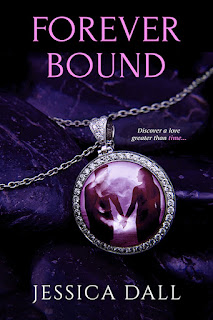 |
| Author Jessica Dall |
I bumped into Jessica Dall when I stumbled upon an essay regarding word shapes. I identified when she confessed to being a name nerd. At one time, I’d written a program that harvested 60 000-some names from the web, including numerous details such as meaning, ethnicity, cognates, and variants. One of the basic rules is to avoid giving characters names with the same leading character (which I’ve flagrantly violated in an upcoming AHMM story). But Jessica brought something new (to me). I had to share her with our mystery colleagues.
Jessica Dall is the author of such novels as Forever Bound and The Stars of Heaven. She has written across an array of genres, though her love of history and romance always seems to find a way into her work. Born and raised in southern California, she now resides in Maryland with her husband and daughter. When not living vicariously through her characters, she enjoys travel, crafting, and helping others with their own writing journey.
You can find her on her web site, Twitter, Facebook, and Instagram.
SleuthSayers, I’m pleased to introduce Jessica Dall.
— Leigh
by
Jessica Dall
Picking names for characters is both one of my favorite and one of the most annoying parts of character building when I’m starting a new book. On the first hand, I’m a name nerd. I love looking at popularity lists and name meanings, finding things that would fit the setting I’m creating. On the other hand, names can really affect how a reader connects with a character—sometimes on a subconscious level. Even in the real world, a 2003 study by the University of Chicago found that traditionally “White-sounding” names received fifty percent more interview requests than identical resumes with traditionally “Black-sounding” ones. And when it comes to fiction, there is the added pressure of making sure that (1) you don’t break suspension of disbelief by using a name that feels wildly out of place for your setting (sometimes even when they would actually fit. See “the Tiffany problem”) and (2) you don’t trip a reader up while they are reading.
While this latter point can be a problem simple from a name being very complicated (if you have a fantasy character named F’thasheewerbhion, the reader is most likely either going to need to slow down to try to sound it out, breaking the flow of the story, or just think of the character as “F…whatever” the entire book) it can also be an issue with even common names that are easily confused with one another (for example, Alex and Alec).
One thing you quickly learn as an author when you’re ask to do readings is that you need to practice out loud. This isn’t only to make sure you get the delivery right, but it is the only way to make sure you have the right amount to read for your time slot. Everyone’s reading and speaking speeds obviously differ, but it is easily possible to read an extra hundred words a minute in your head than reading aloud— a difference that quickly stacks up in a ten-, fifteen-, or even thirty-minute reading.
Part of the way that people can read so much more quickly in their heads is that brains often take in the “shape” of familiar words and phrases and fill in what should be there are you move forward. This is how even several rounds of professional editing can sometimes not catch typos like missing or repeated words. Your brain is expecting to read “top of the class,” not “top of class,” and skips over the fact that that isn’t what’s on the page. It is because of this phenomenon that some writers suggest not starting character names with the same letter. Where F’thasheewerbhion may become “F-whatever” to keep the reader from needing to sound it out, even a “simple” name like Alan might register mostly as the “A” with the reader’s brain filling in “Alan” much like it fills in the missing “the” above. If there is then a “Alice” on the same page, a reader subconsciously doing this would need to slow down and figure out which character is doing what versus getting caught up in the action.
Personally, I don’t subscribe to anything that austere. For example, in my most recent novel, Forever Bound, there is both a Cormac and a Colm. While there is possibly some room for confusion, I felt comfortable using both because they don’t have the same name “shape.” While some readers’ brains may take the first letter and run with it, I find it is more common for people to take in the entire shape of the word, even while reading quickly. Because of that, the issue with Alan and Alice isn’t only that they both start with A, but that the shape of the two names is relatively similar. They are an A followed by a “tall” letter (l) and then close to the same number of “short” letters. This makes them visually very similar to a quick reader. Alternatively, “Cormac” is a C followed by all short letters and “Colm” is a shorter name with a tall letter in the third spot. This makes them more visually different even at first glance.
To note, I also took into consideration the fact that these two characters never share a scene together. This separation also makes it less likely for the reader to get tripped up versus in, say, a quick back and forth dialogue. Similarly, I don’t worry about minor characters who aren’t active players in the story as much as I do those often front and center. For example, in another novel, The Stars of Heaven, I have both a João and a John.
Normally, these would be too visually similar for me to feel comfortable using. However, since João is a very minor character, only ever mentioned a few times in exposition, I wasn’t worried about readers getting confused, and thus I felt free to indulge myself (I specifically made the choice since it means that both characters are more or less named John (João is the Portuguese equivalent). Since the book takes place in the eighteenth century, when John was an exceedingly popular name choice, it seemed fitting. I also found it amusing, since both characters are sailors and so linked by the name).
When it comes to naming characters, though, I always suggest writers pay attention not only to if the name fits their setting, but if it will affect readability. A big part of this is paying attention to name shapes. Namely (pun intended), you should look if two names you are using are similar lengths and have tall (e.g. “l, f, b”) short (e.g. “s, r, o”) or long (e.g. “y, g, p”) letters in similar places. Where it’s relatively easy for readers to keep track of who’s speaking when it’s Anne and Alexander having a conversation, it’s going to force some people to backtrack and lose the flow of the story if it’s Alex and Alec. All those little things really help shape the experience of reading the story in a way many don’t think about.

